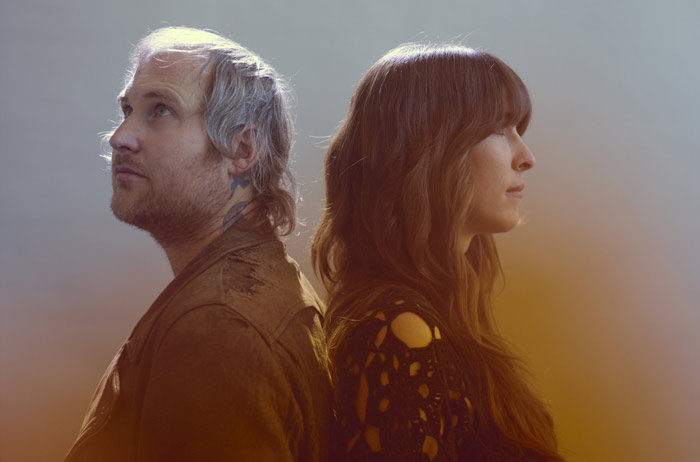
Forever in Dub
by Kevin J. Elliott
Aaron and Ingra Coyes use the time honored traditions of dub as their sonic template, but what they weave onto that canvas is downright mystical. Rooted in those echoed grooves and subterranean beats, but hinting at what could happen when those murky confines are transcended, last year’s critically lauded 936 album caught listeners off guard. Peaking Lights project dub as a religion, and tied to the spiritual and naturalist themes which shape their music, their latest, Lucifer, is a revelation. The album is a hymnal of sorts, linking their terrestrial limits to the celestial realm they wish to reach. On the surface, Lucifer is crisper and clearer than its predecessor, and its songs are more prone to forming into catchy pop songs than amorphous clouds of psychedelic bliss. With Lucifer, it’s an easy transition into the cult of Peaking Lights, even as they veer close to the existential truths they seek out. It’s deep stuff for certain. I suppose that’s why a lot of my conversation with Aaron Coyes, who I caught packing right before a big European tour, orbited more around the cyclical being of Lucifer than the actual sounds on the record.
Your last album, 936, got a lot of attention for such a strange record. Were you and Indra surprised that it reached a much wider audience than the average Not Not Fun release?
Aaron Coyes: Totally man. We are still pretty surprised by that.
With that in mind, did that attention skew your approach in writing and recording Lucifer?
AC: I don’t think so. Much of what we do is based on the technology around us. We recorded (debut album) Imaginary Falcons on quarter-inch tape machine. Those were the only means we had. We recorded 936 in a studio, but we had limited time. This one, we had three weeks in the studio, but we didn’t write anything before the studio. Each of the processes has been so different that I don’t think we’ve ever had the time to be concerned about anything like that.
Most of your music is based in spirituality and nature so I’m very interested in why you decided to call this record Lucifer/
AC: Part of it is that nature thing, and the cycle of the morning star. Lucifer is in reference to Venus. The whole theme of it is rooted in cycles, and I think both of us were into the idea of the morning light and the sight of the sun rising. Especially after having our son, it just kind of fit.
I feel like it has a very strong nocturnal vibe in the mood and in the titles of the songs. Was that the plan for this record?
AC: It’s not even the cycle of the night. It’s the cycle in general, the cycle of night and day. You can’t have one without the other. Or maybe cell regeneration in plants, or humans, or even the cycle of winter to summer. Everything dies and then comes forth again. All of those things are very similar, and I think our themes are representations of that.
You have a son now, and you take him on the road with you. How has that changed the dynamic of the band? Has it influenced your sound or direction at all?
AC: I feel like it’s definitely influenced our sound and our direction too. We started writing songs for him a little bit. The way that we started writing was to play for him and see his response to it, especially in the rhythm, and if he gets real stoked on it, we go from there. He’s like a mini-producer.
Not many artists base their songs in dub, but you two are heavily influenced by that sound. What initially drew you to that music?
AC: Dub has been, for me—even when I was just a punk and stuff—an early form of psychedelic music that I got into. It’s not anything really intense. It’s just something that I got into when I was younger. I love bass and I love the textures and rhythms. How the rhythms are set up is just beautiful.
I love that you put together a remix album of 936. Was that something that you’ve always wanted to do?
AC: It came about spontaneously. I’m totally into it because it reminds me of the ’60s and ’70s, when bands would cover other bands’ songs. It’s almost like that, but it’s a different time. Remixing is bringing musicians closer to each other, and I think it’s a cool way to experience the time that you live in with others who are into the creative process.
And when you play live, which I’ve yet to see, does improvisation play a strong role or are you trying to duplicate what you’ve done on this album?
AC: A lot of it is improv, but then there’s also something more dubbed out. It’s almost as if now we are performing even more dub versions of the songs. I don’t know how to describe it. I think we are constantly working on changing the impressions of our songs. Before, when I was playing guitar live and having it less dubbed out, it was still jammy. Now it’s jammy, but it gets heavily psychedelic. It’s more in a tripped-out sort of zone. Now I’m able to deal with the sound as an engineer, rather than a musician. I’m still a musician, but I approach it more as an engineer.
